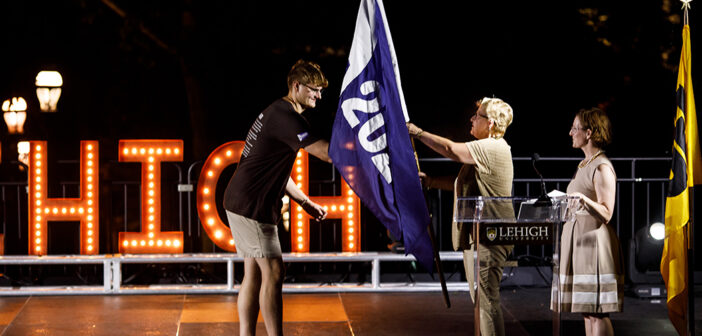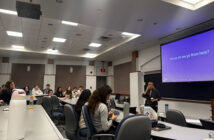When Amy Lemle’s, ‘75, dream of attending college in Boston was squandered by Vietnam War protests, she realized she needed a school quieter and closer to her home in New York.
Lehigh seemed to be the perfect fit for Lemle, who expected her time in Pennsylvania would be quaint and comfortable, excluding the fact that she would be part of the first-ever co-ed class admitted to the university.
Since admitting the first group of female students to the institution in 1971, Lehigh has been able to reinvent its student body. According to university data, the campus is now composed of 54 percent male students and 46 percent female students.
Fifty years later, Lemle said she reminisces on her experience at Lehigh as the happiest time of her life.
As an alumni of the Mustard and Cheese Drama Society and reporter for The Brown and White, the psychology major’s life on campus doesn’t stray far from that of a student on campus today.
“It was insane,” Lemle said. “We were all so excited and nervous at the same time. There were just so few of us — around 150 women with 3,200 men.”
Marilyn ‘Mardi’ Blacher-Reich, ‘75, pursued a degree in psychology and became a member of the Gryphon society, as well as volunteered for several local organizations.
Lemle and Blacher-Reich said that during their time at Lehigh, they felt their presence was frequently appreciated, although not all of their classmates and faculty displayed this affection.
“I never felt slighted in my (arts and sciences) classes, ever, and I definitely felt that it was equal,” Lemle said. “But, I don’t think that was the same for some of the girls in the other programs.”
Blacher-Reich said she took an English course that focused on particularly sexualized poetry, which was taught by a male professor to a class of around 25 men and two women. She said she felt as though it was “chauvinistic” and “embarrassing.”
“There were no issues with the class of ‘74 guys,” Blacker-Reich said. “But, the older classes came into Lehigh choosing an all-male school, so they were uncomfortable. You could tell they were. They stayed away from us.”
Mardi Blacher-Reich said her younger sister Natalie Blacher, ‘78, took a course in which she learned how to use tools to renovate a home, showing the progress that was made in courses at the university in just a few years.
In January of 1991, 20 years after the university began accepting women, the Women’s Center opened its doors.
Founder Kathy Calabrese said she aimed to help men and women learn how to talk and listen respectfully to one another.
Calabrese said the center was a necessity in recruiting and retaining female and minority students, and it gave these groups a safe space to share ideas, network and brainstorm.
Rita Jones, current director of the center, which has been renamed the Center for Gender Equity, said she has witnessed a transformation on campus.
“It moved from ‘There’s just this problem, I don’t know what to do,’ into ‘This is a problem,’ and then identifying why and how and what role they want to play, along with asking for support from different spaces,” Jones said.
Maddie Schott, ‘24, said she believes it is important for women at Lehigh to prove they are equal to men academically, although stereotypes still plague our community.
She said she believes that women at the collegiate level should not face any setbacks, and by striving for leadership positions and internships, she has been able to push forward.
Schott said one of the areas she feels a discrepancy between men and women on campus is among safety concerns.
“My friends and I always have a buddy system and never walk alone at night,” Schott said. “I’ve noticed talking to my guy friends that they have never really thought about that to the same extent.”
Blacher-Reich said she also felt unsafe at times on campus. She said most of the dorms were left unlocked until late at night with little to no external security measures and groups of male students could enter the Palmer, Carothers and Stoughton dorms, where all female students lived, at their discretion.
When looking at her classmates after decades apart, Blacher-Reich said she is proud to see how accomplished they have become in their careers. She said the immersive experiences she had at Lehigh prepared her and her peers for their future in the workforce.
“We didn’t have that kind of thought about how far we could get in life,” Blacher-Reich said. “I don’t think we were there. But, we didn’t have those high expectations they have now because of the glass ceiling.”






Comment policy
Comments posted to The Brown and White website are reviewed by a moderator before being approved. Incendiary speech or harassing language, including comments targeted at individuals, may be deemed unacceptable and not published. Spam and other soliciting will also be declined.
The Brown and White also reserves the right to not publish entirely anonymous comments.